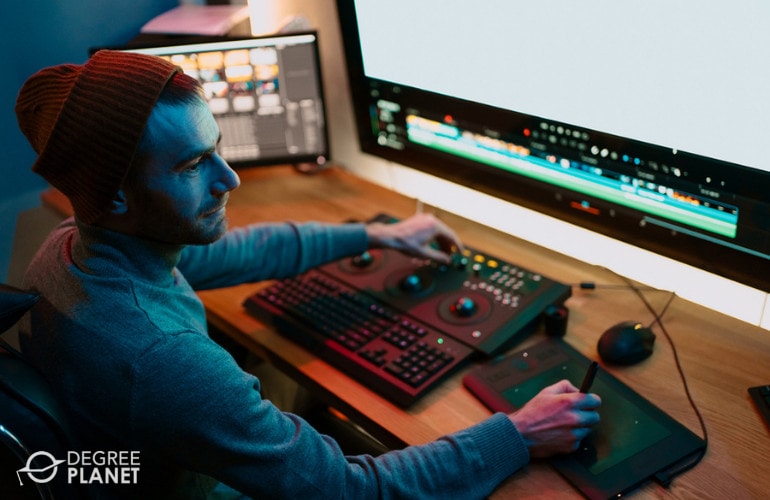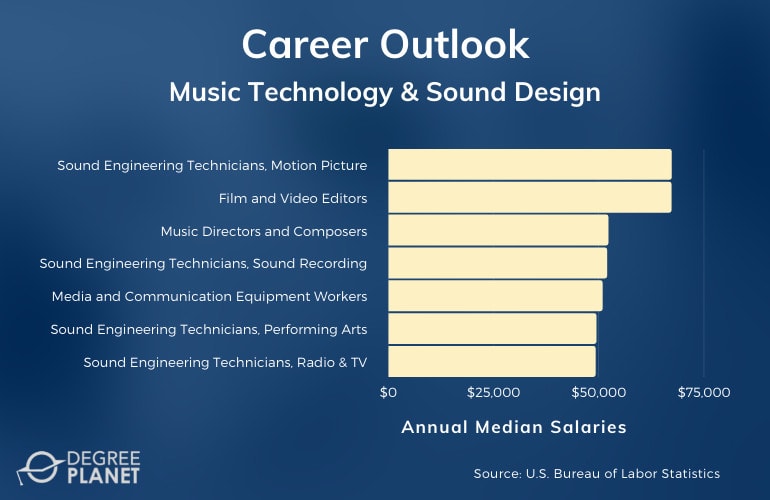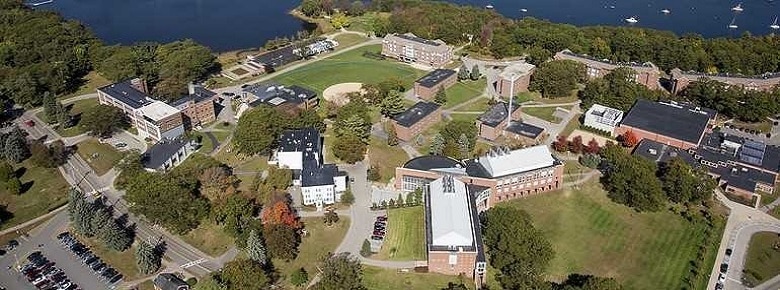An online music technology degree offers a great springboard for careers in audio technology, studio recording, and music engineering.

Most music technology programs cover not only sound boards but also music production, music theory, and songwriting.
Editorial Listing ShortCode:
If you want to learn practical job skills that deal with both music and computers, this major may be a good fit for you.
Online Music Technology Degrees

A music technology online degree can help you learn a wide range of practical and versatile skills related to audio visual technologies, audio recording, live sound, and music production.
Editorial Listing ShortCode:
Most programs also cover advanced training in recording and mixing, which is applicable in different types of music production efforts involving distinct genres and instruments. You might be surprised by how many topics are covered in most online music tech programs. Here are some topics that are typically included:
- Music industry trends and technologies
- Basic digital music production
- Songwriting and musical composition
- Music mixing and mastering
- Digital audio workstations
- Music theory for audio producers
A bachelor’s degree in music tech can help equip you for entry-level jobs and prepare you for more advanced training or graduate study down the road.
Music Technology and Sound Design Careers & Salaries

Music engineering and sound production jobs will likely require on-the-job training, but getting an online music tech degree could help you boost your confidence, knowledge, and qualifications.
Many music technology online degree programs help you master the use of audio engineering tools used by today’s professionals, making this kind of program both creative and practical. According to the Bureau of Labor Statistics, there are many careers across this dynamic sector that offer above-average pay and positive job growth.
| Careers | Annual Median Salaries |
| Sound Engineering Technicians, Motion Picture and Video Industries | $67,290 |
| Film and Video Editors | $67,250 |
| Music Directors and Composers | $52,250 |
| Sound Engineering Technicians, Sound Recording Industries | $51,940 |
| Media and Communication Equipment Workers | $50,870 |
| Sound Engineering Technicians, Performing Arts Companies | $49,400 |
| Sound Engineering Technicians, Radio and Television Broadcasting | $49,210 |
| Audio and Video Technicians | $47,920 |
| Broadcast Technicians | $43,570 |
| Sound Engineering Technicians, Colleges, Universities, and Professional Schools | $31,330 |
Sound engineering and music technology degree programs can open doors to a variety of career pathways. Some positions in this field are more artistically oriented, and others emphasize electronic engineering and software skills.
Exploring the many career options in the field can help you narrow down your professional goals and determine which music tech or related bachelor’s programs best fit your learning interests.
How to Know If a Bachelor’s Degree in Music Technology Is Right for You

Music technology majors can learn skills that are designed to help them qualify for real jobs in a well-defined industry space. That said, people in this field often have combined interests in both music and technology.
Asking yourself the following questions may help you determine if this kind of major is right for you:
- Do you enjoy music and different musical genres?
- Are you interested in songwriting, music theory, and composition?
- Do you enjoy working with technologies and computers?
- Are you looking to gain practical job training in the music field?
If you answered “yes” to all or most of these questions, then a bachelors in music technology might be a good fit for you.
Bachelors in Music Technology Curriculum & Courses

Courses will vary by program, but degrees in music technology at accredited schools typically offer opportunities to take courses similar to these:
- History of Studio Recording and Music Technology: You’ll learn about the growth of the electronic music industry, about the evolution of popular recorded sounds and musical styles, and about digital distribution and production trends.
- Introduction to Music Technology: You’ll explore how to create music with electronic keyboards and computers while learning about Pro Tools audio equipment and other popular audio workstations.
- Basic Music Production: You’ll learn basic principles and methods related to music composition, mixing, mastering, and effective use of digital audio workstations.
- Studio Recording: This course provides more in-depth learning and training related to the use of mixing boards, microphone technology, music dynamics, signal processors, and sound physics.
- Advanced Studio Recording: You’ll learn about advanced techniques in studio recording and electronic music production, including techniques that pros use for specific types of instruments, audio effects, percussion, and voice.
- Music Theory for Audio Production: This course teaches you about musical notation, rhythm, scales, melody, and popular genres.
- Concert Audio Production: This course covers numerous concepts and technologies widely used for live-sound performances, including amplification, monitoring, balancing, and recording.
- Creating Multi-Track Recordings: This is an intensive course on making multi-track recordings, with insights into how to blend, balance, and synchronize tracks.
- Musical Composition and Songwriting Techniques: This course helps music technology majors understand fundamental methods in song development. Studio production work can include artistic direction, experimentation, or fine-tuning song lyrics or a sound score. It can also include audio engineering, mixing, and recording steps.
- Audio-Visual Production: This course looks at music and audio technology with an emphasis on video and film production.
A robust bachelor’s degree program in music technology helps you understand key elements of the whole production and recording process.
Admissions Requirements

Getting into a music technology bachelors online may require some or all of the following:
- SAT or ACT scores (only some schools require them)
- High school diploma or equivalent
- Satisfactory GPA
- Letters of recommendation
Admissions requirements can vary from program to program, so it’s beneficial to look up the specific requirements of prospective schools.
Accreditation

It’s beneficial to choose a school that’s fully accredited. Regional accreditation provides the assurance that you’ll get rigorous instruction, qualified faculty, and satisfactory student support services. Accreditation can also be a precondition for financial aid. It might factor into requirements for some forms of professional certification as well.
Editorial Listing ShortCode:
As you compare schools, it’s beneficial to check their accreditation statuses. For more information on accreditation or finding accredited schools, you can visit the Council for Higher Education Accreditation (CHEA).
Financial Aid and Scholarships

Getting a bachelor’s degree can help prepare you for the workforce, but what if you don’t know how to pay for college in the meantime? Many students apply for financial aid to help cover their upfront costs.
Financial aid can come in many forms, such as federal or state grants, scholarships, or student loans. It’s strategic to review the terms and conditions of any financial aid packages before accepting them. Filling out and submitting the Free Application for Federal Student Aid (FAFSA) is often a good first step if you plan to seek financial assistance.
What Is a Music Technology Major?

A music technology major is a degree program that teaches students about sound recording, music mixing and mastering, studio recording, and audio engineering. You can also learn about audio engineering tools that are widely used in the industry.
Music tech degrees typically help you master a range of skills required across this professional sector. You can learn about music composition and artistic production, studio recording methods, and related computer and electronic engineering concepts.
What Can You Do with a Music Technology Degree?

What you can do with a music technology degree is likely to depend on your areas of interest, your academic specialization, your work experience, and other industry factors.
That said, professionals with music technology degrees are trained to operate audio workstations. They can also operate audio and sound equipment, including microphones, amplifiers, sound boards, and electronic music and recording software. Many careers across the sector are projected to have above-average job growth.
For instance, the Bureau of Labor Statistics projects 17% job growth for sound engineering technicians and 26% job growth for audio and video technicians over the next ten years.
How Long Does It Take to Get a Degree in Music Technology Bachelors Online?

If you follow a traditional 16 week semester and attend full-time, it will typically take 4 years to complete a bachelors degree, whether you’re attending in person or online. Some schools offer accelerated options, often with 8 week terms and continuous, year-round enrollment. Following an accelerated academic calendar may allow you to finish your degree in less time.
If you choose to study for a music degree online, you might have a wider range of schools and programs to choose from. This can often increase your chances of finding accredited schools with accelerated music technology programs that align with your goals and interests.
How Much Do Music Engineers Make?
Careers in the music technology field come with a wide range of salaries. Those salaries will sometimes vary based on areas of specialization, technology skill sets, and special industry certifications, among other factors.
Editorial Listing ShortCode:
Some bachelor’s programs in music technology can help you earn certifications that are specific to the most widely-used professional audio recording tools and software. According to the Bureau of Labor Statistics, the median salary for sound engineering technicians is $53,520, with most earning between $27,650 and $119,720 each year.
What’s the Difference Between Audio Engineering vs. Music Production?
Audio engineering is a mostly technical role related to music recording. Production work often contains many overlapping processes, including artistic development, production contracts, licensing agreements, and digital mastering and distribution.
| Audio Engineer | Music Producer |
|
|
You may want to consider whether you want to pursue a pathway that emphasizes technical, engineering-related expertise or a broader skill set related to artistic direction and production efforts.
Is a Music Technology Degree Worth It?

Yes, a music technology degree is worth it for many students. Common roles related to music technology include audio technician, studio recording specialist, music producer, live-music sound technician, and audio engineer.
With the rapid expansion of video distribution across many platforms, it’s likely that jobs in video production and related audio engineering work will see some robust growth too. In fact, the Bureau of Labor Statistics projects 26% job growth for audio and video technicians over the next ten years.
Jobs for sound engineering technicians are slated to grow 17%. Getting a bachelor’s in music technology could be a strategic way to take advantage of these trends.
Universities Offering Online Bachelors in Music Technology Degree Programs
Methodology: The following school list is in alphabetical order. To be included, a college or university must be regionally accredited and offer degree programs online or in a hybrid format.

The Academy of Art University offers a BFA in Music Production, Music Scoring and Composition, and Sound Design. AAU’s online classes provide the same rigorous education as classes on campus but with greater flexibility. Each of these programs provides students with the opportunity to develop a professional portfolio to showcase their skills.
Academy of Art University is accredited by the WASC Senior College and University Commission.

Baptist College of Florida offers bachelor’s degree programs in music, music education, and music in worship leadership. BCF aims to provide all of its students with a biblical theological foundation, and applicants are asked to provide a church or pastor recommendation. Graduates of BCF’s music programs often become performing musicians, music teachers, and music ministers.
The Baptist College of Florida is accredited by the Southern Association of Colleges and Schools Commission on Colleges.

Berklee College of Music offers an online Bachelor of Arts in Music Production. Students in the program have opportunities to learn to how to multitrack record, overdub, edit, and mix music. The program aims to teach skills relevant to those wanting to work as music producers, recording engineers, sound technicians, and similar roles. The application requires an essay and two letters of recommendation.
Berklee College of Music is accredited by the New England Commission of Higher Education.

Juilliard College offers a Bachelor of Music in Composition that focuses on classical music composition. The program covers ear training, music theory and analysis, music history, and more, and students are given many opportunities to have their music heard by the public. Juilliard also aims to provide its undergraduate music students with a strong liberal arts foundation.
Juilliard is accredited by Middle States Commission on Higher Education.

Liberty University offers a B.S. in Commercial Music. Courses are 100% online and just 8 weeks long, which can help students balance earning their degrees with work and family commitments. The program takes an average of 3.5 years to complete. Liberty University encourages students to integrate Christian faith into music production and expression.
Liberty University is accredited by the Southern Association of Colleges and Schools Commission on Colleges.

The University of Maine at Augusta has on-campus, online, and low-residency bachelor’s degree programs in contemporary and popular music. Students in these programs can study music technology, music history, aural skills, and the business of music. UMA offers low student-to-faculty ratios and highly personalized instruction. Applicants must complete an audition.
The University of Maine at Augusta is accredited by the New England Commission of Higher Education.

The University of Michigan—Flint offers a Bachelor of Music Education in which students are expected to create an Individual Major Portfolio. Courses in the program include Music Theory, Aural Harmony, Music History, Music Technology, Music in World Cultures, and more. Students are also expected to complete student teaching experiences. This degree program is for those who want to teach music in K-12 schools.
The University of Michigan-Flint is accredited by the Higher Learning Commission.

The University of New England offers an online Bachelor of Music program. UNE follows a trimester calendar, and the program can potentially be complete in just 3 years. The program covers a wide variety of music genres, including contemporary, classical, popular, and electronic.
The University of New England is accredited by the New England Commission of Higher Education.

The University of Rochester’s Eastman School of Music offers a variety of music majors. Options include Applied Music (Performance), Composition, Music Education, Theory, and Jazz Studies and Contemporary Media. Students can also choose a double major. Eastman students often pursue careers as musicians, music educators, composers, theorists, and musicologists.
The University of Rochester is accredited by the Middle States Commission on Higher Education.

Virginia Wesleyan University offers a Bachelor of Arts in Digital Music. The program can help students develop a core of piano and keyboard skills and provides studies in music history, music technology, digital composition, and sound recording. Students often pursue careers in the entertainment industry, education, music therapy, and related fields.
Virginia Wesleyan University is accredited by the Southern Association of Colleges and Schools Commission on Colleges.
Getting Your Music Technology Bachelors Degree Online

If you love music and technology, then pursuing a music technology online degree from an accredited school could help you develop practical skills in this growing sector.
Getting a bachelor’s in this field could help prepare you for a rewarding career in music technology or music production work. In addition, studying online can generally offer flexible and convenient learning options. Students more interested in majoring in music production may want to explore online music production degree programs that some universities offer.
So, why wait? The sooner you start exploring music technology degrees, the sooner you may find programs that match your goals and learning preferences.

